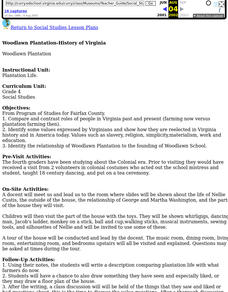Curated OER
Samuel's Choice - Social Studies Using Children's Literature
Fifth graders read a book about independence, freedom, and slavery. Students create a story map of the book. They research the causes of the Civil War. Students write a newspaper article from the point of view of an American colonist.
Curated OER
Equaino
Students describe and discuss reasons that slaves were treated with indignity. While reading passages from the author Olaudah Equiano, students stop periodically to discuss major points about The Middle Passage. They investigate...
Curated OER
Triangular Trade and Middle Passage Review Individual Worksheet
Eighth graders explore the key concepts within the Colonization of America, the significance of the Triangular Trade Route, the origin of slavery, and the Middle Passage. After a short discussion and review, 8th graders orally practice...
Curated OER
Search for Words: Abraham Lincoln and the Civil War
In this American history worksheet, students read 12 words pertaining to Abraham Lincoln, the Civil War and slavery. Students find the words in a word search.
Curated OER
Gold Rush Abolitionists: How different was the role of Spanish-speaking blacks under Mexican rule from the role of English-speaking blacks under U.S. rule?
Students determine how Spanish-speaking blacks and English speaking blacks were treated differently. For this emancipation lesson, students compare the Mexican and American rules regarding slavery.
Curated OER
The Underground Railroad and The Fugitive Slave Law of 1850
Students discover racism and slavery by completing a role playing activity. In this U.S. history instructional activity, students analyze documents from the Civil War era and describe the Fugitive Slave Law. Students view a video on...
Curated OER
Historical Events
Fourth graders make predictions about the story Sweet Clara and the Freedom Quilt based on what they know about slavery. In this predictions lesson plan, 4th graders finish reading the story to see if they were right.
Curated OER
Fugitive Slave Act of 1850
Students take a closer look at the Fugitive Slave Act of 1850. In this slavery lesson, students examine an image and read excerpts from Uncle Tom's Cabin as well as the Fugitive Slave Act of 1850. Students discuss their analysis of the...
Curated OER
Underground Railroad Activity
Eighth graders practice their interviewing skills as they learn about the Underground Railroad. In this slavery activity, 8th graders discuss the existence and operation of the railroad. Students then interview one another in the...
Curated OER
Underground Railroad Tic-Tac-Toe
Young scholars discover details about the Underground Railroad. In this slavery instructional activity, students read primary documents about fugitive slaves and analyze the sources using the provided worksheets.
Curated OER
The Underground Railroad Before and After the Fugitive Slave Law
Students consider the impact of the Fugitive Slave Law on the activity of the Underground Railroad. In this slavery lesson, students examine primary documents that describe the role of the Underground Railroad during the fight for...
American Evolution
Virginia Runaway Slave Ads
What does an ad reveal about a culture, or about the values of its intended audience? Class members examine a series of runaway slave ads—one of which was written by Thomas Jefferson—and consider what these primary source documents...
K12 Reader
Uncle Tom’s Cabin: George’s Speech
Sometimes it takes a work of fiction to demonstrate nonfictional tragedies and events. George, an escaped slave, describes to Mr. Wilson the hardships of his life in a short passage from Harriet Beecher Stowe's novel, Uncle Tom's Cabin.
Carolina K-12
Group Project: Freedom Parade
Parades are a great way to celebrate. Get young historians into the festivities by asking them to create an informational float for a Freedom Parade. Picking a topic from the provided list or suggesting one of their own, class members...
Gilder Lehrman Institute of American History
Slave Narratives: Frederick Douglass, Harriet Jacobs, and the Columbian Orator
Young historians practice in-depth, quality analysis of primary source texts in this three-lesson unit, which examines excerpts from the slave narratives of Frederick Douglass, Harriet Jacobs, and Caleb Bingham.
Crafting Freedom
The Self-Empowerment of Harriet Jacobs
In a hands-on learning activity, pupils read about and recreate the experience of Harriet Jacobs, author of one of the most famous slave narratives of all time in which she describes her years of hiding from her master in a confined...
Curated OER
History Through Picture Books and Photographs
First graders become familiar with historical figures central to the Underground Railroad and anti-slavery.
Curated OER
Lesson Two: An Overview of Modern-Day Slavery
Students discuss the aspects of modern-day slavery. They investigate where slavery is located, what causes it, who is involved and ways to eliminate it. They write a journal entry based on their investigation.
Curated OER
Lesson Six: Types of Modern-Day Slavery
Young scholars examine the geography of modern-day slavery. They locate where slavery exists and what type it is on a world map.
Curated OER
Lesson Four: Understanding the Personal Reality of Slavery
Students investigate the four types of modern-day slavery: forced, debt bondage, chattel and child labor. They create a piece of art depicting their feelings after reading a case study about slavery.
Curated OER
Uncle Tom's Cabin as Anti-Slavery Argument
Pupils read and discuss how African- Americans are depicted in slave auction announcements. They research how Harriet Beecher Stow responds to the sale of slaves.
Curated OER
Slavery in Colonial America
Students examine the experience of the middle passage of slaves. They review slave songs and discuss their common themes. They develop a monologue in which they integrate a fragment of an actual slave song into a poem they have written.
Curated OER
Woodlawn Plantation
Fourth graders engage in a series of pre and post visit activities to the Woodlawn Plantation in order to enhance their learning experience there. Writing and art activities are part of the lesson plan.
Curated OER
Figurative Language in Toni Morrison's "A Mercy"
In order to read and respond to Toni Morrison's A Mercy in this figurative-language instructional activity, students discuss the differences between a literal and a figurative interpretation of a text. They explore figures of speech...
Other popular searches
- Up From Slavery
- Civil War Slavery
- Abraham Lincoln and Slavery
- Slavery Art
- Abolition of Slavery
- American Slavery
- Anti Slavery Poetry
- African American Slavery
- Slavery Issue
- Controversy Over Slavery
- Escaping From Slavery
- Constitution: Slavery

























